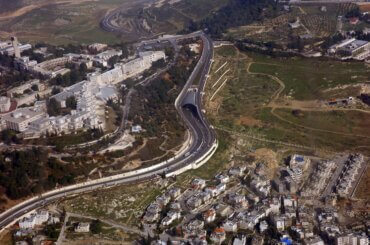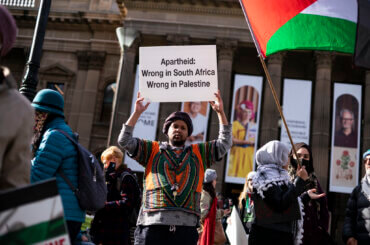The book is “Arabs and Jews in Ottoman Palestine” and it was suggested to me by a friend. In it, Alan Dowty seeks to examine the roots of the Israeli-Palestinian conflict and to this end analyses the history of the Yishuv in Palestine during the tail end of the Ottoman era and its relations with the ‘Arab’ inhabitants of the country.
What caught my attention, however, is the reductionist dichotomy in the book title – ‘Arabs’ and ‘Jews’. On its own, each one of these words is loaded enough. Put together or against each other, the terms have had serious impact on many people’s perception of the conflict.
In this article I’m mostly concerned with the term ‘Arab.’ Yes indeed, as far as language and the overall cultural heritage are concerned, we Palestinians are an intrinsic part of the Arab World. But when it comes to the Israeli-Palestinian conflict, the issue is a lot more complex. Over the years, we were made more Arab than we actually are. Our ‘Arabism’ has been overemphasised at the expense of our Palestinianism. The second layer of identity, in other words, was pushed up to the top in order to become THE dominant identity. This was done by design, and has slowly grown into a deceiving ‘common sense.’ Allow me to elaborate.
In order to legitimise the Jews’ right to Palestine, Zionism sought to delegitimise the Palestinian existence in the land. That involved a largely psychological process of ‘nativisation’ of European Jews and ‘de-nativisation’ of Palestinians. Eventually this necessitated physical displacement (of Palestinians) and then replacement (by European Jews). The term ‘Arab’ was one of the tactics used to achieve such goal.
Today, although the term ‘Palestinian’ is used in Israel’s mainstream media, the term ‘Arab’ is still the common term on the street. In fact, after decades of occupation, it has become common sense even to many Palestinians as well. Who says self-colonisation doesn’t exist?!
But why does it matter? Palestinians are Arabs after all, commented my Jewish-Israeli friend.
I don’t blame my Jewish-Israeli friend, he was born into this deceiving ‘common sense’ and possibly wasn’t exposed to different frames of reference. We Palestinians are guilty of similar things, too. Many of us still use the term ‘Jewish’ and ‘Zionist’ interchangeably without giving it much thought. After all, Israel has been shoving the ‘Jewish identity’ rhetoric in our faces on every turn. It would’ve been bizarre if that hadn’t produced stereotypes and misconceptions.
Nevertheless, to answer his question, referring to Palestinians as simply ‘Arabs’ helps sustain the Zionist denial of the Palestinians as an independent identity and culture. The rationale goes as follows: if there is no distinct Palestinian identity, then there is no or has not been such thing as Palestine. And, accordingly, Israel is not an invader or an occupier. Not only is this self-legitimisation, but also a defensive mechanism against guilt. And, by the way, you don’t need to consciously feel guilt in order for it to exist. It can manifest in a myriad of ways. Denial is one, excessive aggressiveness is another.
Also, the term ‘Arab’ falsely suggests that the Arab world is a single entity that displays uniform attitudes and policies vis-à-vis the Jews, Zionism, and/or Israel, and that Israel is standing alone, surrounded by tens of millions of antagonistic Arabs. This worldview is part of the Zionist narrative of “the few against the many”, where the ‘Jews’ stood alone against several ‘Arab’ armies in what was perceived (and promoted) as a potential second Shoah.
The Arab/Jew dichotomy also has an ethno-political dimension, not only for Palestinians, but for non-Ashkenazi Jews as well. The rise of Zionism and, later, modern Arab nationalism reconstructed what was originally a religious difference – Arab Muslims and Arab Jews – into a nationalistic discourse where Judaism was affiliated with Zionism and vice verse, and was somewhat disconnected from the broader Arab ethnicity/identity that transcended religion.
Mizrahi Jews as a result were subjected to a systematic process of de-Arabisation upon their arrival in the Ashkenazi-dominated Israel in the early 1950s. They were urged to see Judaism and Zionism as synonyms, and Jewishness and Arabness as antonyms. Among other things, this artificial identity created a cultural and political schizophrenia in the Mizrahi community, trapping them between hatred of the Arabs (especially Palestinians) and self-hate…
What makes the term ‘Arab’ particularly problematic is that it provides easy answers to much of Israel’s self-image and narratives. Consider, for example, some of the writings of Benny Morris.
Morris is one of Israel’s prominent historians. It was he who coined the term ‘new historians,’ to refer to the group of revisionist historians who emerged in the late 1980s in Israel. His book on the Palestinian refugee problem (1989), in fact, was a paradigm shift in Israel’s historical narratives regarding the 1948 war. Although a counter-narrative of a sort, Morris in the beginning of the book seems to continue some of the stereotypical analysis often embraced by (most) of Jewish-Israeli scholars about Mandate Palestine’s society.
He explains Zionism’s triumph in 1948 in terms of what he calls the “the fatal weakness of Palestinian Arab society,” which he attributed to the “lack of governing institutions, and [because of] norms and traditions.” He explains that “Palestine Arabs, still caught up in the village-centred political outlook, had no sense of separate national or cultural identity to distinguish them from, say, the Arabs of Syria, Lebanon or Egypt.” This strikes me as a bold, sweeping statement for a historical account. I can only imagine my late grandfather, the villager, raising his eyebrows with astonishment hearing such a statement.
Morris appears uninterested in (or perhaps incapable of) explaining the societal characteristics upon which he builds his core argument. Apparently, these are natural (primitive) characteristics that hindered the formation of a cohesive and politically conscious Palestinian society, as opposed to the naturally cohesive and nationally conscious European Jews. To a Palestinian ear, Morris speaks like an Orientalist anthropologist, but not without serious political implications. That is, lack of unity and cohesion amongst the ‘Arabs of Palestine’ and their identification with the surrounding Arab countries could only mean one thing: lack of political consciousness. And guess who lacks political consciousness? Those lacking nationhood.

Other Jewish-Israeli ‘new historians’ were more moderate, they didn’t delete Palestinian identity altogether. Instead, they assessed it through a Zionist perspective – which, rather ironically, is what much of Israel’s new historiography was meant to oppose. Palestinianism was made a byproduct of Zionism. Some even commented that in the process of creating a Jewish nationalism, Zionism created two. Meaning, only due to the external threat of Zionism, did the ‘Arabs of Palestine’ feel a sense of national consciousness.
This is a wild claim, offensive, and outright arrogant. It is not more informed, much less entitled, than some of the Jewish-Israelis who ‘challenged’ me to name a Palestinian leader before Arafat. Yes, seriously, I was asked that, on multiple occasions. And almost every time, I was paralysed by the sheer assumption that we Palestinians were just a historical anomaly that popped into existence in 1948. As if we are by definition a reaction, never an action, never existed before the Zionist mission civilisatrice took off. As if we were mere Arabs, plain undefined camel-riding Arabs, and Zionism granted us a sense of self to be our own unique identity, to be Palestinians.
Yes, we are Arabs, but not as much as you think we are, or in the fashion you perceive or want us to be. ‘Palestinian’ is the word, Arab is just an extension of our identity, like European for the French or Asian for the Chinese. So, please, don’t call us what you want us to be. Please, don’t call us ‘Arab.’



It’s unfortunate that – like all Zionists – Ms. Matar hypocritically chooses Jewish / “Jewish State” supremacism and associated injustices and immorality over justice, accountability, equality and respect for human rights.
It’s disturbing that advocating, committing, supporting and/or defending her preferred brand of evil puts a smile on her face.
The problem with Emad Moussa’s article is that in the name of challenging Orientalism he ignores the reality of the existing population. The area of Mandate Palestine was, before the British arrived called either Syria or Palestine. That also included what became Transjordan.
I don’t think there is any doubt that the Arabs of Palestine in Ottoman times did not have a Palestinian national consciousness. Not surprisingly since we are talking about a society that was gradually emerging from feudal relations.
So yes it can indeed be said that Zionism brought forth 2 nations – Israeli Jewish and Palestinian. Except that would be wrong. The Israeli Jews can, at best, be called a settler nation. As such they are, like the South African Whites before them, part of the Palestinian people, whether they like it or not.
It has to be said that Palestinian Israelis see themselves predominantly as Israeli Arabs which is not surprising since everything in Israel is divided into Jewish or Arab. There is though a wider argument as to whether all Arabs form a single nation since there is linguistic unity throughout the region.
Thanks for this article. This issue is well known of course, but it is good to hear your opinion.
When referring to Palestinians after 1948 I always call them Palestinians. E.g. not “Israeli Arabs”, but “Israeli Palestinians” or “Palestinian Israelis” (maybe you don’t like “Israeli Palestinians” because it is also Zionist framing!?)
When referring to Palestinians before 1948 I never use plain “Arabs”, but mostly the more neutral “Palestinian Arabs”, but maybe that is still too much Zionist framing?
Should the boundary between “Palestinians” and “Palestinian Arabs” be at the start of the Mandate? Or earlier? In Ottoman times Palestine was not a separate territory, but Palestinian national identity was already forming.
Another issue is that national identity is a modern concept that originated in Europa. I think in 1948 Zionism’s Jewish national identity was more developed than Palestinian national identity (the many fractures in Palestinian society were an important weakness in 1948).
For the record:
The region between the Jordan River and the Med. Sea was referred to as “Palestine” by the Greek historian Herodotus (“the father of history”) during the 5th century BCE.
In the mid-4th Century BCE, Aristotle referred to “Palestine” while discussing the Dead Sea in his Meteorology. “Again if, as is fabled, there is a lake in Palestine…”
Jewish historian Josephus’s (c.37-100 CE) The Jewish War, Antiquities of the Jews contains many references to both “Palestine” & “Palestinians.”
Contemporaries of Jesus also routinely referred to Palestine as “Palestine.”
In the first decade of the 1st Century, the Roman poet Ovid mentioned “Palestine” in both his famed mythological poem “Metamorphoses” & his erotic elegy “The Art of Love.” He also wrote of “the waters of Palestine” in his calendrical poem “Fasti.” Tibullus, another Latin poet, wrote of “the crowded cities of Palestine” in “Messalla’s Triumph” in his poem “Delia.”
The Zionist claim that the Roman emperor Hadrian changed the name of the region to “Syria Palaestina” or simply “Palestine,” in 135 CE is contradicted by the fact that by then, the terms “Syrian Palestine” & “Palestine” had already been in use for over 600 years.
The opening sentence of the section entitled “Filastin” in the book “Dictionary of the Lands,” written by geographer Yaqut ibn Abdullah al-Hamawi in 1225: “Filastin: It is the last one of the regions of Syria in the direction of Egypt. Its most famous cities are Ashkelon, Ramle, Gaza, Arsuf, Caesaria, Nablus, Jericho, Jaffa & Beit Guvrin.” (cont’d)
Interesting piece. In the 19th century, both Jews and Muslims living in Palestine were called Arabs.